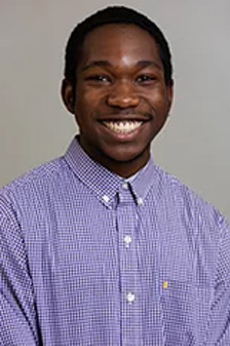Major: Computer Science and Mathematics

ABSTRACT:
Understanding Machine Learning Bias without a Ground Truth
Describe your project:
My project aimed to understand how predictive computer algorithms can impose biases across protected groups (e.g. race, gender, etc.) when it is not possible to use common measures of comparing an algorithm’s predicted outcome with its intended outcome.
Who is your mentor(s) for your project? How did you find your mentor? Why did you choose them?
My mentor was Dr. Anand Sarwate, Assistant Professor in the Department of Electrical and Computer Engineering at Rutgers University. It is ironic, actually, because he found me. I applied to the RiSE Research Experience at Rutgers through the Big Ten Academic Alliance Summer Research Opportunities application, and he reached out to me because my interest in data science and machine learning would be a perfect fit for this project. I chose him because I was primarily interested in this field, but also because I was honored someone would want to take me under their wing to conduct research.
How did you become interested in this project?
This project sparked my interest because it lies at the intersection of ethics and computer science. I have always loved coding. But also, I think it is important to understand how individual actions contribute to the structure of our society. We inherently give power to computers when we start to depend on them to make very complex human decisions, like choosing from a pool of resumes who the most qualified applicants are for a job. For the computer scientists who create these machine learning algorithms, it is important that we understand the impact to what our programs–discriminatory or not–can affect the world we live in. Since the field of machine learning fairness stems from an analysis that saw black men to be twice as likely of being miscategorized of being high risk of committing a crime again compared to white criminals, I wanted to make sure that people who look like me are not going to be marginally discriminated against based upon a computer’s decision.
What has been the hardest part about your research/what was the most unexpected thing about being a researcher?
The hardest part about researching this summer was overcoming the jargon barrier used in this specific field of machine learning fairness. Being fairly new to research, the novel vocabulary made research feel very advanced and out of my scope of understanding. Once I got over the language barrier, I remembered that research is simply asking questions and then seeing if those questions can be answered. Reading papers and getting acclimated to the conventions of contemporary researchers took a lot of time and effort, but it was overall worthwhile because research is really fun!
What has been the most rewarding part?
The most rewarding part about researching this summer is that I can talk about the importance of making fair predictive algorithms to anyone. Making people aware that machine learning algorithms, like Google search results, learn from observations (data), and if the scope of their observations is biased, then the algorithms will inherit those biases as well. Since this field is very interdisciplinary, I believe it is crucial for researchers to be able to express their ideas in ways that individuals of varying fields and expertise can easily understand why their work is important. This allows for more collaboration from other academic areas as well as making the essence of research a more inclusive experience. Bringing more viewpoints on an important topic like machine learning fairness will point us in the direction of the best solution.
How will you disseminate your research?
I have presented my research at the RiSE at Rutgers Symposium, and the UMBC Summer Undergraduate Research Fest (SURF). I plan on presenting at URCAD in April, and at an undergraduate research conference this year.
What is your advice to other students about getting involved in research?
For UMBC students wanting to get into research, there is no requirement to be in a scholars program or have honors achievement. Research is a simple concept that anyone can do. Anyone who has ever identified a problem and envisioned the problem being solved is a researcher at heart. It may be really intimidating to be working with people who have high degrees and extensive amounts of experience, but those garnishes will never replace the foundation of a researcher. When anyone enters the world of research, it is important for them to bring their own experiences, perspective, and culture. Diversity of thought makes problem-solving progress faster. Additionally, treat attending class as an opportunity to understand rather than to get good grades; this skill and knowledge-base will easily transfer into research. Get in contact with a professor who has interesting research, talk with them about their research, then get started! If research may be too much for the school year, applying to summer research opportunities is a great option!
What are your career goals?
After going to graduate school and getting my Ph.D., I would love to work at a university as a professor, then maybe become the dean of a college. I want everyone to feel that learning is an exciting, thriving, living aspect of our everyday lives. I would also like to work with computer scientists, educators, and policymakers to ensure developing technologies are being developed for the overall social good of our world.
9/4/18